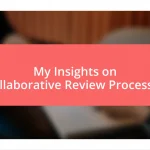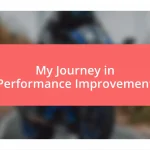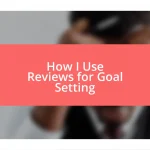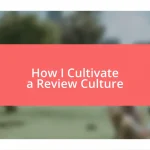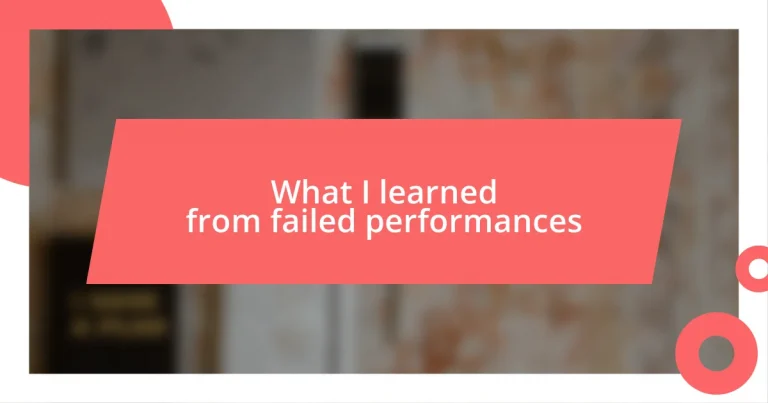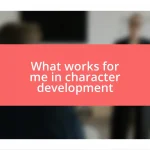Key takeaways:
- Performance failures often reveal critical insights about preparation, mindset, and emotional connection with the audience.
- Constructive criticism serves as a catalyst for growth, helping performers refine their craft and connect better with their audience.
- Embracing vulnerability and resilience in response to setbacks can transform failures into valuable learning experiences and pave the way for future success.
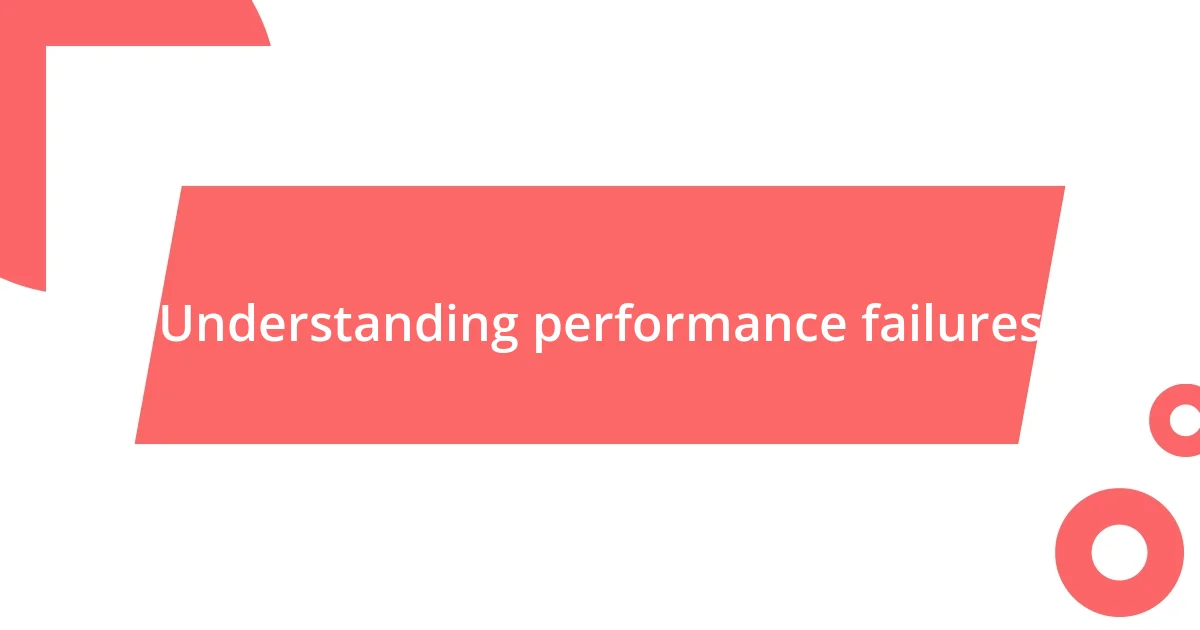
Understanding performance failures
Understanding performance failures can be a deeply transformative experience. Reflecting on my own moments of failure, I remember a particular presentation where my nerves got the best of me. It was as if my mind went blank, and I struggled to recover. Have you ever felt that sinking feeling when you know you’ve lost your audience? It’s not just about the performance itself but also what it reveals about our preparation and mindset.
In many ways, performance failures are pivotal learning moments. I once had a singing competition where I misjudged the emotional connection I needed to convey, resulting in a flat delivery. It struck me then: how often do we overlook the emotional aspect of what we do? This failure taught me that connecting with the audience goes beyond technical skills; it’s about understanding their feelings and responding to them.
Sometimes, the fear of failure can overshadow our willingness to take risks. I vividly remember holding back during a theater performance because I was scared of making a mistake. Yet, when I finally let myself embrace that fear, I discovered that failure is often a stepping stone to greater creativity and authenticity. Isn’t it fascinating how much we can learn from those challenging moments?
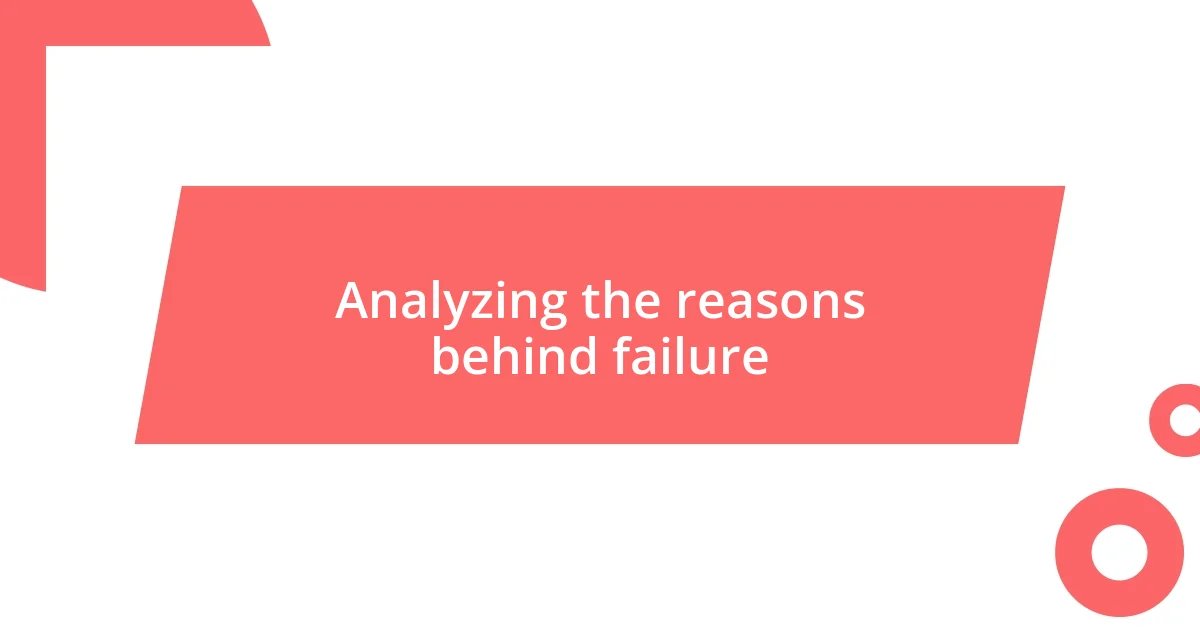
Analyzing the reasons behind failure
Analyzing the reasons behind performance failures reveals that several factors often contribute to these experiences. I distinctly recall a time when I prepared diligently for a public speaking event only to be derailed by technical difficulties. It made me realize how relying too heavily on technology can sometimes backfire. Such incidents remind us of the importance of contingency plans and adaptability.
Another reason for failure can be our mindset. I remember heading into a dance competition, filled with self-doubt and comparing myself to others. That negative mindset stifled my ability to perform fully, leading to a lackluster outcome. It taught me that confidence plays a crucial role in performance; if we don’t believe in ourselves, how can we expect anyone else to?
Finally, communication barriers can significantly impact a performance’s success. In one acting workshop, I hesitated to express my character’s emotions fully, fearing judgment from my peers. This hesitation resulted in a performance that didn’t resonate. It became clear that being vulnerable and open in our expression is key to connecting with our audience. How often do we let fear hold us back in similar situations?
| Reason for Failure | Personal Anecdote |
|---|---|
| Technical Issues | Technical difficulties disrupted my public speaking event. |
| Mindset | Self-doubt affected my performance during a dance competition. |
| Communication Barriers | Fear of judgment hindered my acting workshop performance. |
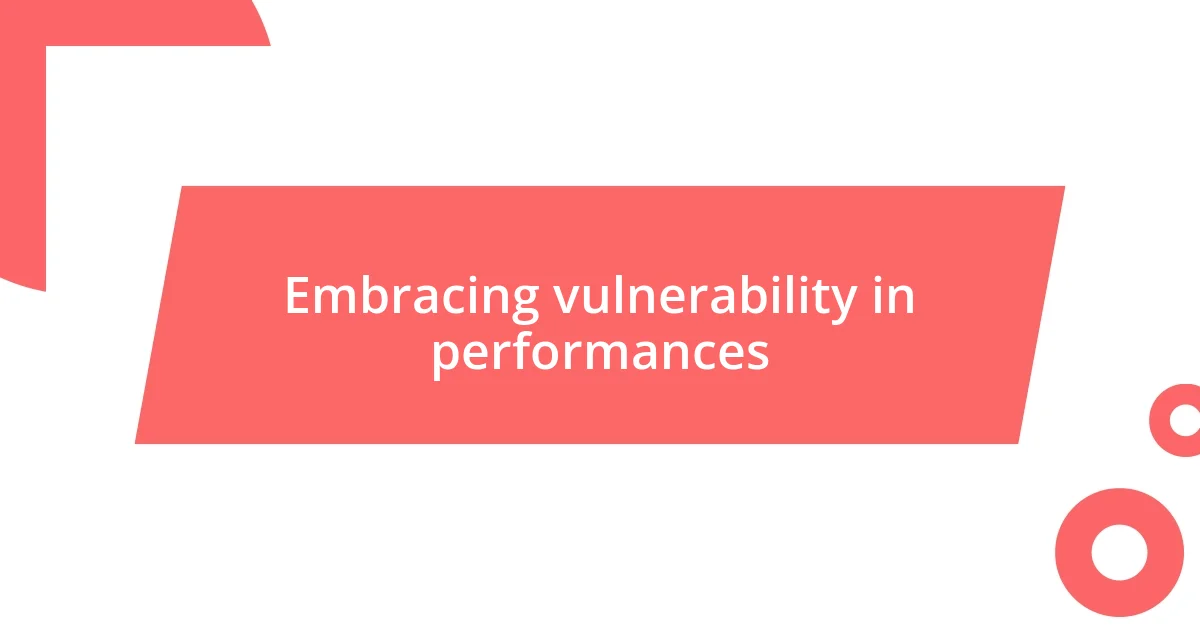
Embracing vulnerability in performances
Embracing vulnerability in performances has been a game changer for me. I remember stepping onto stage for a poetry reading, my heart racing as I shared a deeply personal piece about loss. Each word felt like a raw reveal, and I held my breath, anticipating judgment. But instead, the audience leaned in, their silence inviting connection. It struck me then that my willingness to be vulnerable opened a space not just for me, but for them to relate and feel.
- Vulnerability allows for authenticity; it builds trust with your audience.
- Sharing personal stories can create profound connections; I’ve witnessed audiences respond with empathy when I laid bare my struggles.
- Overcoming the fear of criticism fosters creativity; I often find my most genuine self emerges when I let go of perfectionism.
In moments of vulnerability, I’ve tried to reflect deeply on my feelings and recognize that everyone has their insecurities. During a live music gig, I found myself forgetting lyrics in front of an unfamiliar crowd, feeling exposed and embarrassed. Yet, instead of shutting down, I laughed it off, joking with the audience. They appreciated my honesty, and I realized then that vulnerability isn’t a weakness; it’s a bridge to deeper engagement and connection.
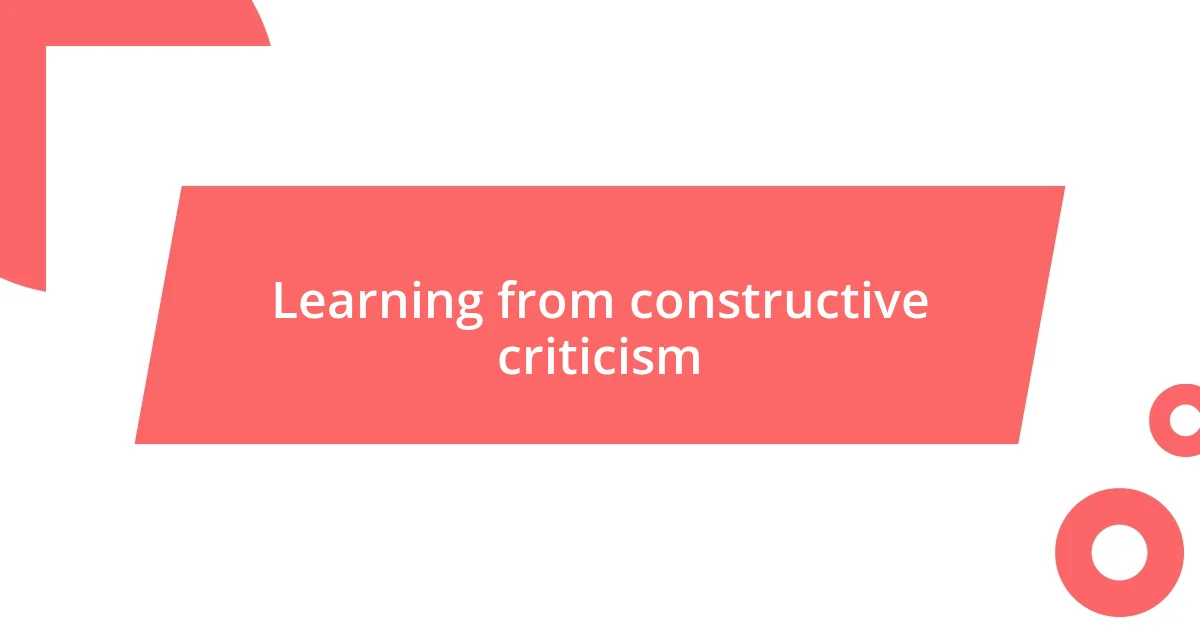
Learning from constructive criticism
Constructive criticism can sometimes feel like a punch to the gut, can’t it? But I’ve learned to see it as a guiding light instead. One evening, at a local theatre, I received feedback on my performance that stung at first. A fellow actor pointed out my overly dramatic gestures that distracted from my character. At that moment, I could’ve taken it personally, but instead, I chose to adapt. The next show, I focused on subtlety, and the audience’s reactions were night and day. Who knew a little feedback could make such a difference?
I recall a time when I shared a new song with friends, and one of them suggested I simplify the melody. Initially, my ego flared up. How could they not appreciate the intricacies? Yet, after some reflection, I took their advice to heart. The stripped-down version resonated way more with listeners. Isn’t it fascinating how sometimes a fresh perspective can unveil our blind spots? I realized that constructive criticism is often rooted in love, aimed at helping us shine brighter.
Looking back, I’ve come to appreciate how constructive criticism serves as a catalyst for growth. I often think about how an audience perceives our art; they might see what we overlook. It’s not just about hitting the right notes or delivering the perfect line but about connecting with people. Have you ever found that the most impactful feedback comes from those who genuinely want to see you succeed? It’s that genuine desire that reminds me to embrace all forms of criticism.
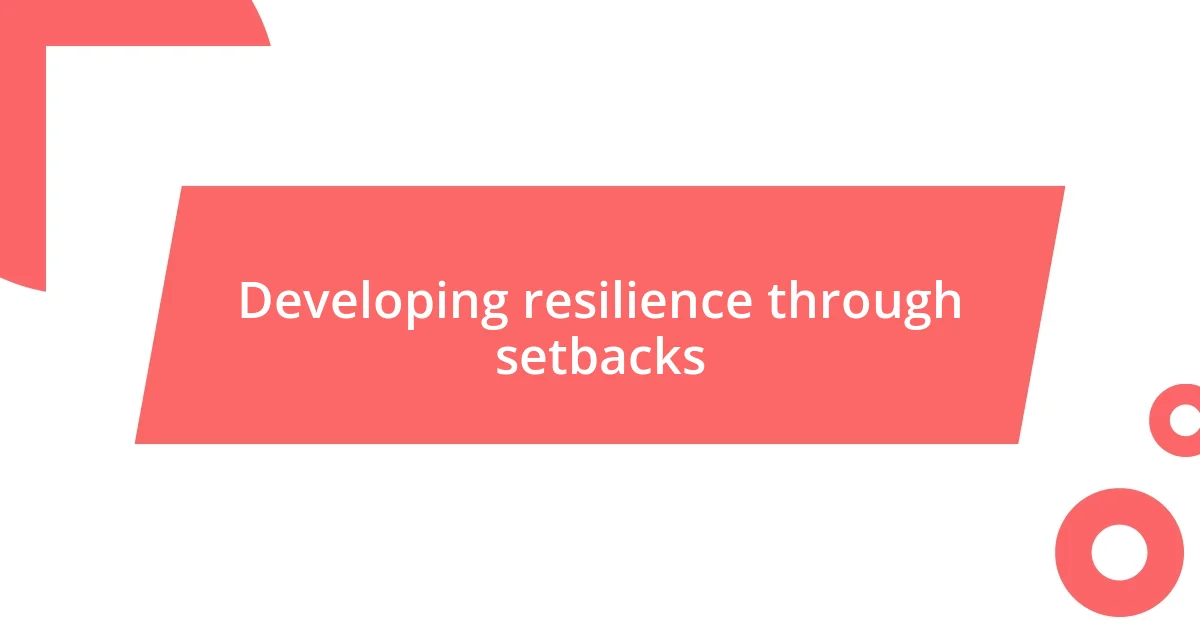
Developing resilience through setbacks
When I think about resilience, it often springs from moments of failure. I can recall a time during a critical performance when everything went wrong—I stumbled over words, the lighting was off, and my confidence slipped away like sand through my fingers. Instead of losing myself in that chaos, I took a moment to breathe and remembered that setbacks are simply stepping stones. Each misstep taught me something valuable, fostering a resilience I didn’t know I had.
Resilience isn’t just about enduring; it’s also about rebounding with strength. I once faced a disastrous audition where I left the room feeling defeated. But as I processed the experience, I realized that this setback was an opportunity to refine my craft. I started taking vocal lessons and immersed myself in character studies. The next time I stepped in front of casting directors, I felt not just prepared, but empowered. Have you ever noticed how resilience can transform the narrative of our failures into stories of growth?
Through these experiences, I’ve learned that every stumble can fortify our resolve. There was a night when I performed in front of a crowd that seemed completely unresponsive. It was disheartening, yet something sparked in me to push forward. I reminded myself that I was there to share my art, regardless of immediate reactions. Reflecting on this taught me that resilience cultivates not just endurance, but also the courage to keep sharing our passions, no matter how challenging the circumstances may be. Isn’t it fascinating how a single setback can reshape our approach and strengthen our artistry?
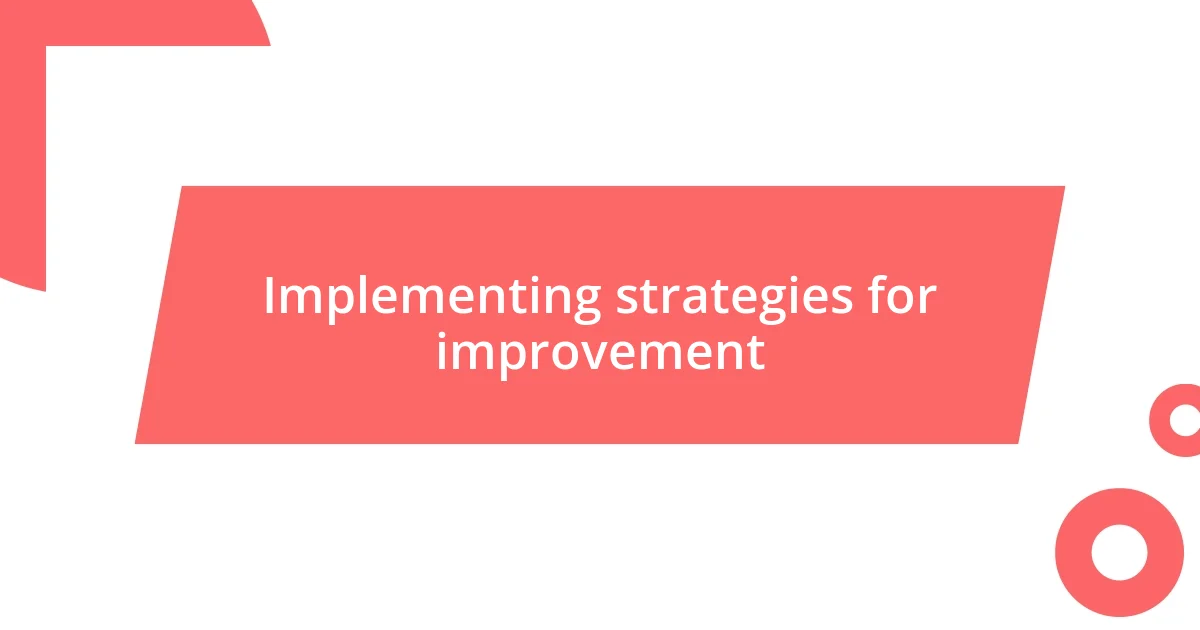
Implementing strategies for improvement
Implementing strategies for improvement can feel like a daunting task, but I’ve found that the key is to start small. After a performance that left me feeling less than proud, I sat down with my notes and identified one specific area to work on—breath control. So, in the days leading up to my next gig, I dedicated time to practicing breathing exercises. Just a few minutes each day made a remarkable difference in my delivery. Isn’t it amazing how honing in on one aspect can elevate the overall performance?
Collaboration also plays an essential role in this journey of continuous improvement. I remember a time when I invited a fellow performer to watch and critique my rehearsals. Their fresh eyes caught details I had overlooked, like how my nervous habits affected my stage presence. This partnership opened my eyes to the nuances of performance that can easily be missed when we’re in the thick of it. Have you ever thought about how collaboration can enrich our creative endeavors?
Finally, I emphasize the importance of self-reflection after each performance. It took me some time to realize that setting aside a few moments for honest reflection can be invaluable. I’ve kept a journal detailing what went well and what didn’t. For instance, I once forgot my lines during a critical scene, but reflecting on it later helped me see how my nervousness had sabotaged my focus. By acknowledging both successes and failures, I’m better equipped to face the next challenge head-on. What have you learned from your own reflections after a performance?
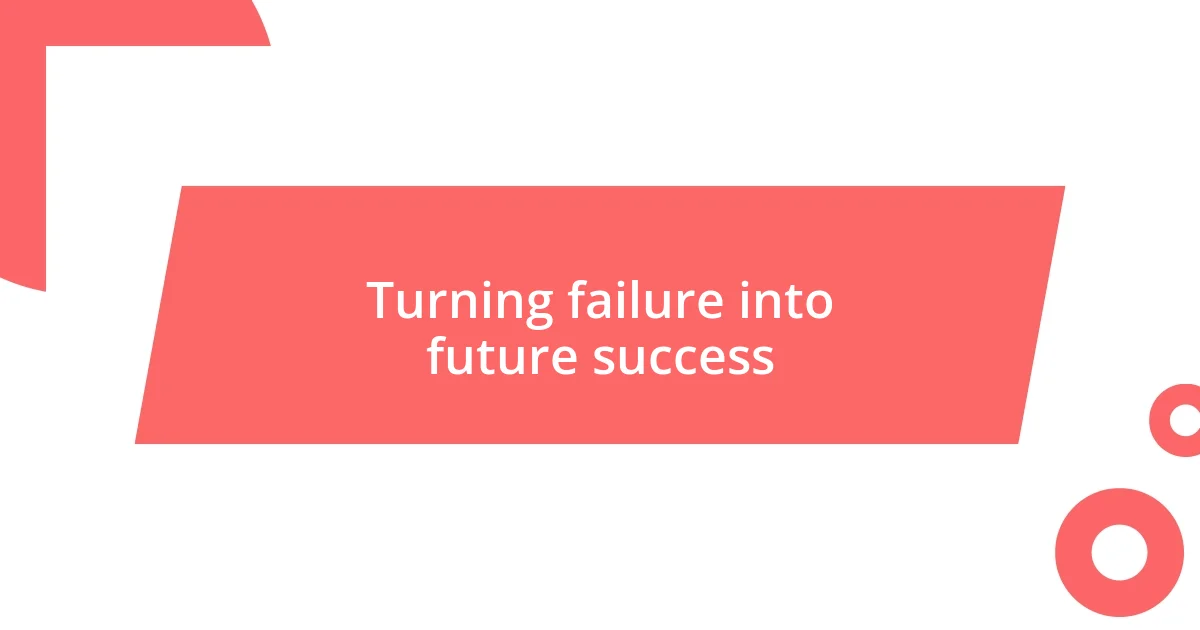
Turning failure into future success
There’s something powerful about recognizing failure as a powerful teacher in our journeys. I remember one particular evening where I completely misjudged the audience’s vibe. As I left the stage, I felt an avalanche of disappointment washing over me. But instead of letting that gut-wrenching experience linger in my mind, I decided to analyze what went wrong. In doing so, I discovered that the energy I brought to the performance had a direct impact on how the audience responded. It really hit me—what if failure was merely a signpost directing me toward a better version of myself?
Building on those moments, I realized that adapting is crucial for future success. After experiencing a particularly tough show, I sought advice from a mentor. They suggested experimenting with different styles and techniques, encouraging me to step out of my comfort zone. So, I tried a new performance style that felt daring. I was initially apprehensive, but the exhilaration of trying something fresh opened new doors. Have you ever found that pushing your boundaries can lead to unexpected growth?
Looking back, I can see how each setback added depth to my understanding and artistry. In one instance, a catastrophic sound glitch disrupted my act. Instead of being defeated, I took that experience and began to explore improvisation—a skill I now cherish. I now view my previous failures not as endings but as the beginnings of more resilient and creative efforts. Isn’t it intriguing how those “failures” can weave into the fabric of future successes?

